In working on Write Better (due out October 2019), I asked some other authors about their experiences with writer’s block, especially one unexpected form. Having written one book, authors often find major hurdles in finishing a second, especially if the first was successful. I call this Second-Book Syndrome. I couldn’t fit all of Alan Fadling’s helpful comments in the book, so here, with his permission, is more of what he told me.
I really did wrestle with my second book, An Unhurried Leader. Some of the dynamics were probably unique to me, and some are, I’m sure, common to many, such as a major vocational transition.
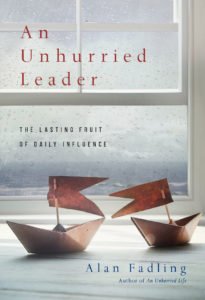 I also had to deal with the unexpected success of the first book, An Unhurried Life. Where I could have simply been grateful and encouraged by a CT book award (which I was, actually), I also let it become a point of fear and anxiety: “How in the world do I top my first effort? How can my second book be anything but a disappointment to readers of the first?”
I also had to deal with the unexpected success of the first book, An Unhurried Life. Where I could have simply been grateful and encouraged by a CT book award (which I was, actually), I also let it become a point of fear and anxiety: “How in the world do I top my first effort? How can my second book be anything but a disappointment to readers of the first?”
I overcame this by deciding that my goal was not to top my first effort, but simply to share some important insights that had meant a lot to me. It helped me to think that writing this second book was something I wanted, and maybe even needed to do. Instead of focusing on the imagined response of future readers, I focused on sharing my stories, my insights, my experiences, trusting that they would be helpful to those future readers.
I also dealt some of the resistances I felt writing book one and feel now writing book three with my wife. I shared the paragraph below with a friend who is an aspiring writer.
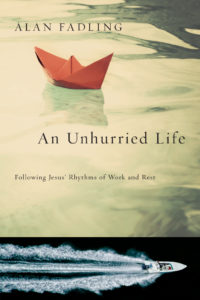 “My reasons for not writing are legion. I don’t feel like it. I don’t have anything to say right now. What I have to say won’t help anyone. I don’t have a good focus for my writing. I’m in too busy a season to write. I’m in too noisy a place to write. There is too much to write, so I don’t know where to start writing. No one will want to read what I’m writing. No one will want to publish what I’m writing. Ad infinitum.”
“My reasons for not writing are legion. I don’t feel like it. I don’t have anything to say right now. What I have to say won’t help anyone. I don’t have a good focus for my writing. I’m in too busy a season to write. I’m in too noisy a place to write. There is too much to write, so I don’t know where to start writing. No one will want to read what I’m writing. No one will want to publish what I’m writing. Ad infinitum.”
Fear. Anxiety. Self-doubt. Insecurity. Perfectionism. All of these are resistances I often have to press through to write.
The last thing I’ll say is that I find a lot of help in Dallas Willard’s encouragement to release outcomes to God. It is my attachment to outcomes, imagined as amazing or imagined as dire, that gets in my way a lot. Usually, getting unstuck ends up being a matter of being in the present moment, being in the Presence, and being focused on the present task of actually writing.
Alan Fadling

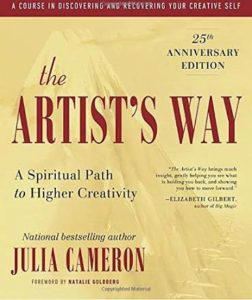
 Eventually something that finds its way into our morning pages may trigger and idea or project we want to pursue. That’s fine. We can work on it outside of our time set aside for morning pages, and that we can show to others for input if desired. But we never show others our morning pages themselves. A friend of mine, Bill, who didn’t think he was very creative undertook Cameron’s disciplines and started producing some remarkable poetry.
Eventually something that finds its way into our morning pages may trigger and idea or project we want to pursue. That’s fine. We can work on it outside of our time set aside for morning pages, and that we can show to others for input if desired. But we never show others our morning pages themselves. A friend of mine, Bill, who didn’t think he was very creative undertook Cameron’s disciplines and started producing some remarkable poetry.
 I think the answer is a lesson in our tendency to take things out of context. Understanding what’s going on depends on seeing the whole sweep of the narrative in all thirty-six chapters of Numbers and the whole sweep of Psalms, not an isolated chapter or verse.
I think the answer is a lesson in our tendency to take things out of context. Understanding what’s going on depends on seeing the whole sweep of the narrative in all thirty-six chapters of Numbers and the whole sweep of Psalms, not an isolated chapter or verse. When we firmly, completely, uncompromisingly put our trust in a particular way of viewing the Bible, ironically we put ourselves at risk of disbelief. Why? Because if one brick of the structure we have built crumbles, then the whole edifice falls.
When we firmly, completely, uncompromisingly put our trust in a particular way of viewing the Bible, ironically we put ourselves at risk of disbelief. Why? Because if one brick of the structure we have built crumbles, then the whole edifice falls. 
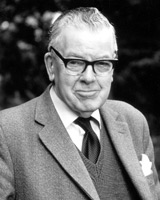
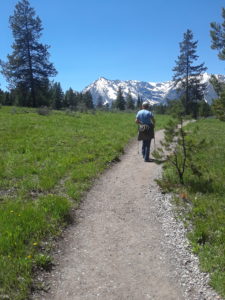 The emphasis on conversionism has had another effect. It has made evangelicals more individualistic than Catholics, who are oriented more toward the community of faith as a primary means for drawing closer to God. Certainly American individualism has had a tremendous impact on American Catholicism as well. American Catholics are much more willing, as mentioned earlier, to disagree with and act contrary to the Church’s teachings than Catholics in many other countries. Nonetheless, when it comes to spirituality, it is primarily a matter of the community.
The emphasis on conversionism has had another effect. It has made evangelicals more individualistic than Catholics, who are oriented more toward the community of faith as a primary means for drawing closer to God. Certainly American individualism has had a tremendous impact on American Catholicism as well. American Catholics are much more willing, as mentioned earlier, to disagree with and act contrary to the Church’s teachings than Catholics in many other countries. Nonetheless, when it comes to spirituality, it is primarily a matter of the community. I said, “The Road to Emmaus is a paradigm of Catholic spirituality, right? Spiritual growth is a journey that we go on. And Christ travels with us on this journey even though we may not know he is there. But we recognize him in the breaking of the bread, in the Eucharist. And our immediate instinct at such times of significant encounter with Christ is to go to the community, just as the two on the Road to Emmaus did. So we have in this paradigm the key elements of the journey, the presence of Christ, the Eucharist and the community that make up much of Catholic spirituality.”2 He looked completely bored, as if I were telling him the sun rises in the east and sets in the west.
I said, “The Road to Emmaus is a paradigm of Catholic spirituality, right? Spiritual growth is a journey that we go on. And Christ travels with us on this journey even though we may not know he is there. But we recognize him in the breaking of the bread, in the Eucharist. And our immediate instinct at such times of significant encounter with Christ is to go to the community, just as the two on the Road to Emmaus did. So we have in this paradigm the key elements of the journey, the presence of Christ, the Eucharist and the community that make up much of Catholic spirituality.”2 He looked completely bored, as if I were telling him the sun rises in the east and sets in the west. “Exactly. Spiritual growth happens in crisis events when we are suddenly thrust to a higher or deeper level of intimacy and commitment to Christ. From that moment we are radically changed. Spirituality proceeds dialectically. There is a radical discontinuity of the past from the future. Sometimes that moment is the crisis of conversion. Sometimes it is hearing a calling or some other new spiritual experience. So I think your Protestant friends may be expecting a Damascus Road experience.”
“Exactly. Spiritual growth happens in crisis events when we are suddenly thrust to a higher or deeper level of intimacy and commitment to Christ. From that moment we are radically changed. Spirituality proceeds dialectically. There is a radical discontinuity of the past from the future. Sometimes that moment is the crisis of conversion. Sometimes it is hearing a calling or some other new spiritual experience. So I think your Protestant friends may be expecting a Damascus Road experience.”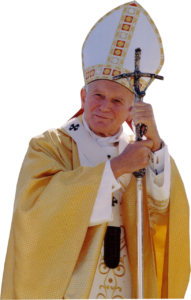 Catholics, by contrast, are very happy to think in terms of both/and. John Paul II was highly revered by Catholics, yet large majorities of Catholics (particularly in North America) felt perfectly at peace disagreeing with him on birth control, priestly celibacy and stem cell research. The inconsistency bothers them little.
Catholics, by contrast, are very happy to think in terms of both/and. John Paul II was highly revered by Catholics, yet large majorities of Catholics (particularly in North America) felt perfectly at peace disagreeing with him on birth control, priestly celibacy and stem cell research. The inconsistency bothers them little.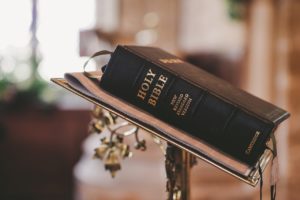 For evangelicals, the game is thought to be won or lost on statements. If we can’t have fixed truth expressed in words, we are subject to every wind of doctrine. We lack an anchor and may drift into heresy or at least into the shoals of liberalism. While Catholics lean toward analogical thinking, Evangelicals tend to embrace what Tracy calls the dialectical imagination. Since we have a tendency to deceive ourselves, we seek certainty. Symbols are too vague to achieve this. Propositions warn us clearly against error, set limits and call us back to truth.
For evangelicals, the game is thought to be won or lost on statements. If we can’t have fixed truth expressed in words, we are subject to every wind of doctrine. We lack an anchor and may drift into heresy or at least into the shoals of liberalism. While Catholics lean toward analogical thinking, Evangelicals tend to embrace what Tracy calls the dialectical imagination. Since we have a tendency to deceive ourselves, we seek certainty. Symbols are too vague to achieve this. Propositions warn us clearly against error, set limits and call us back to truth.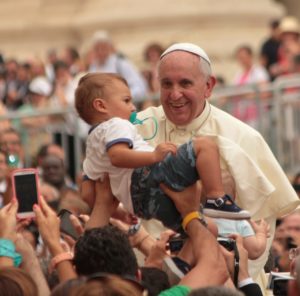 It could only have been someone with God’s sense of humor who had brought us together. But we both loved Jesus and each other, and assumed that was enough.
It could only have been someone with God’s sense of humor who had brought us together. But we both loved Jesus and each other, and assumed that was enough. For Catholics, it was not the document at all that was primary. It was the community, the people of God, the unity of the people of God. If signing the document could help preserve that unity, by all means, sign it—and then do what your conscience requires.
For Catholics, it was not the document at all that was primary. It was the community, the people of God, the unity of the people of God. If signing the document could help preserve that unity, by all means, sign it—and then do what your conscience requires.